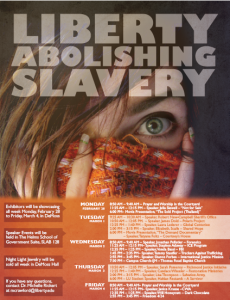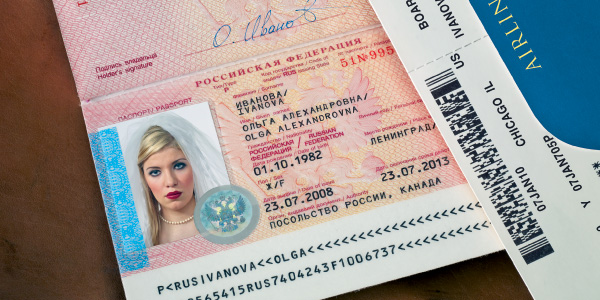Last week served up an extra helping of awareness, education, and passion on Liberty University’s campus in Lynchburg, VA, kicking off the 3rd annual Liberty Abolishing Slavery Week from Feb 28 through March 4, 2011. Throughout the week, Liberty’s Helms School of Government invited locally and nationally renowned guests as experts on the issue of human trafficking to educate and invest in students interested in fighting the world’s modern-day form of slavery. Elizabeth Scaife, Project Coordinator at Shared Hope International, said that she had “never seen a school do anything like this before.” After days of rallying for the fight against the worldwide epidemic of human trafficking alongside fellow students, I’d say Liberty stumbled upon a recipe for success.
Each day, hundreds of students filed in and out of a lecture room—sometimes standing for lack of chairs—to listen to the various speakers inform audiences about human trafficking. Some students that I met listened in between classes, some took off work in order to attend, and some even gave up sleep in the exhausting process of organizing this week-long event. Each ear leaned forward to hear representatives from organizations including Shared Hope International, Polaris Project, Restoration Ministries, Courtney’s House, Truckers Against Trafficking, the FBI and more. And while students soaked up every ounce of information available, speakers gladly provided unique expertise in areas of prevention, policy, awareness, and restoration.
Special thanks goes out to Dr. Michelle Rickert and her husband Paul Rickert from the Helms School of Government for organizing the event and standing as strong advocates for the fight on human trafficking in Virginia. Both professors show a willingness to jump through hoops for raising awareness on this issue. Their leadership inspires students to a movement of change in areas of government, criminal justice, psychology, communications, journalism and more. They have learned all too well how capable America’s college generation can be in accomplishing change among policy. Dr. Rickert even expressed that House Bill 2190, House Bill 1898and Senate Bill 1453 have all passed the Virginia General Assembly in part due to well-supported lobbying from Liberty students.

The success of this week goes to show that college students are capable of becoming informed and passionate about the cause. One student shared her honest opinion that persevering through this week was a struggle because human trafficking is “such a heavy subject.” Sadly, as we struggle through one week of discussion on the topic, many others are living it. Congratulations to Liberty University for taking the first step in eradicating it by breaking the bonds of ignorance.
 A
A  Traffick911, Shared Hope International, and other advocates have partnered for the national
Traffick911, Shared Hope International, and other advocates have partnered for the national 





